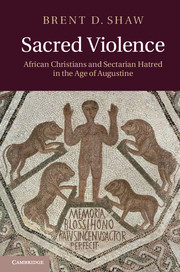Book contents
- Frontmatter
- Contents
- Abbreviations
- Maps
- Acknowledgments
- Introduction
- Chapter 1 This terrible custom
- Chapter 2 Church of the traitors
- Chapter 3 A poisonous brood of vipers
- Chapter 4 Archives of memory
- Chapter 5 The city of denial
- Chapter 6 Ravens feeding on death
- Chapter 7 Little foxes, evil women
- Chapter 8 Guardians of the people
- Chapter 9 In the house of discipline
- Chapter 10 Sing a new song
- Chapter 11 Kings of this world
- Chapter 12 We choose to stand
- Chapter 13 Athletes of death
- Chapter 14 Bad boys
- Chapter 15 Men of blood
- Chapter 16 Divine winds
- Chapter 17 So what?
- Appendix A Bishops and bishoprics in Africa: the numbers
- Appendix B Origins of the division: chronology
- Appendix C The Catholic conference of 348
- Appendix D The Edict of Unity and the Persecution of 347
- Appendix E The mission of Paul and Macarius
- Appendix F Historical fictions: interpreting the circumcellions
- Appendix G The archaeology of suicide
- Appendix H African sermons
- Bibliography
- Index
- References
Introduction
Published online by Cambridge University Press: 07 September 2011
- Frontmatter
- Contents
- Abbreviations
- Maps
- Acknowledgments
- Introduction
- Chapter 1 This terrible custom
- Chapter 2 Church of the traitors
- Chapter 3 A poisonous brood of vipers
- Chapter 4 Archives of memory
- Chapter 5 The city of denial
- Chapter 6 Ravens feeding on death
- Chapter 7 Little foxes, evil women
- Chapter 8 Guardians of the people
- Chapter 9 In the house of discipline
- Chapter 10 Sing a new song
- Chapter 11 Kings of this world
- Chapter 12 We choose to stand
- Chapter 13 Athletes of death
- Chapter 14 Bad boys
- Chapter 15 Men of blood
- Chapter 16 Divine winds
- Chapter 17 So what?
- Appendix A Bishops and bishoprics in Africa: the numbers
- Appendix B Origins of the division: chronology
- Appendix C The Catholic conference of 348
- Appendix D The Edict of Unity and the Persecution of 347
- Appendix E The mission of Paul and Macarius
- Appendix F Historical fictions: interpreting the circumcellions
- Appendix G The archaeology of suicide
- Appendix H African sermons
- Bibliography
- Index
- References
Summary
This is not a nice book. It begins with betrayal and ends with suicide. Set on this sad trajectory, the narrative suggests a mundane parallel to the city of God, a fallible human city. If the ideas created by its actors were transcendent, the story itself was enacted in an imperfect human way. The problem confronted in the following investigation is the meaning of religious violence. This story of violence happened in the age of Augustine in his native Africa, when its lands were provinces of the Roman empire. The events begin in the last decade of the fourth century and they end with the armed incursions of foreign Vandal invaders into Africa about the year 429. The spate of killing and destruction that accompanied the arrival of these “barbarian” outsiders put an end to the small story of sectarian violence that is our focus. The new Vandal lords of Africa swept away the cultural underpinnings of institutions and thought that had sustained the special hatreds of the generations that concern us here. There were now to be new dislikes, as one kind of violence decisively trumped another.
The diminutive tradition of sacred violence that I am considering served to create and to confirm intimate values and personal relationships in Africa. The war brought by the Vandals erased these rich meanings that had been created by sectarian conflict. Our attention is focussed on the earlier church struggles that were an integrating force of a social and religious world that disappeared in 430. Our interest is directed as much to the question of how acts of sectarian violence were thought about and represented in words as it is to the actual threats, beatings, burnings, and killings. In this light, it is perhaps disappointing that our narrative diminishes rather than exalts. Events claimed as peasant rebellions and revolutionary social struggles turn out, on closer inspection, to be smaller and meaner things. The principal actors were moved by the logical, if fulfilling, credulities of religious faith and by not much more. What I have encountered is a history of hate – a story of intimate dislike that was motivated by the profound love for one's own people, beliefs, communities, and traditions.
- Type
- Chapter
- Information
- Sacred ViolenceAfrican Christians and Sectarian Hatred in the Age of Augustine, pp. 1 - 9Publisher: Cambridge University PressPrint publication year: 2011



